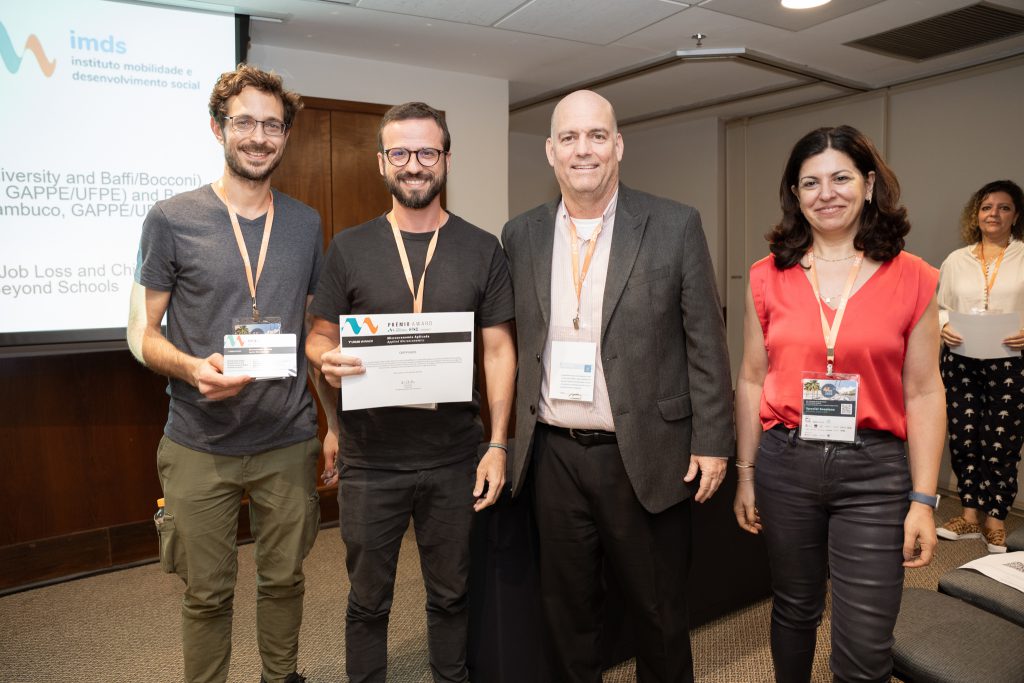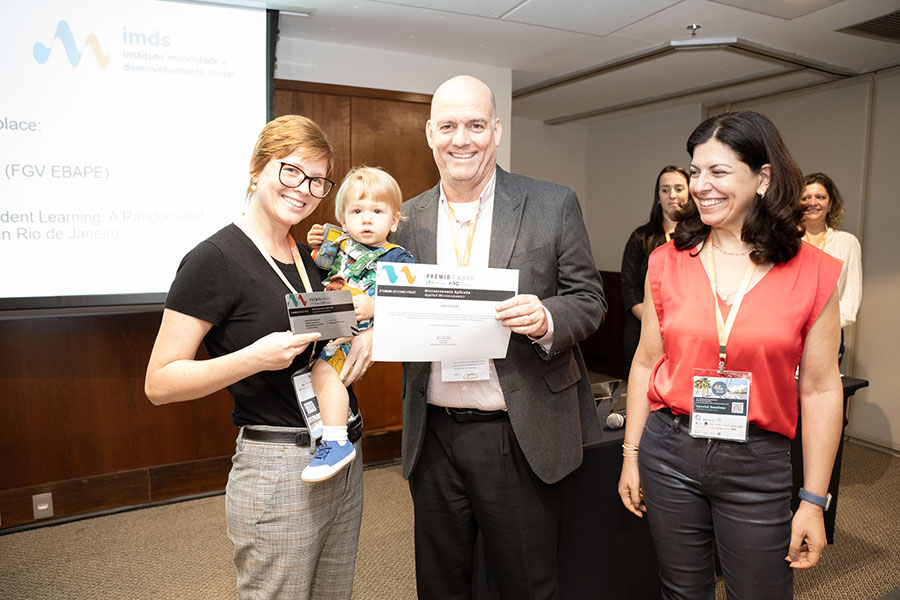
From left to right: Diogo G. C. Britto, Breno Sampaio, Sergio Guimarães e Flávia Chein - Credit: Bianca Claret / SBE
IMDS-SBE Award announces winners
IMDS and the Brazilian Econometric Society announced the winners of the IMDS-SBE Award during the 45th meeting of this institution. The winners were “The Kids Aren’t Alright: Parental Job Loss and Children’s Outcomes Within and Beyond Schools”, by Diogo G. C. Britto, Caique Melo and Breno Sampaio, which took first place. Second place went to “Teacher Mindsets and Student Learning: A Randomized Intervention in Rio de Janeiro”, by Tassia Cruz.
The studies, individual or collective, should address one of the following thematic axes: cognitive and socio-emotional training of children, adolescents, and young people; basic education; health care for children, adolescents and young people; pregnancy support; and training and productive inclusion of young people.
The awards were presented by the IMDS research director, economist Sergio Guimarães Ferreira, during the ceremony held on December 14 in Rio de Janeiro.
Paulo Tafner, CEO of IMDS, opened the presentation session with a thank you to SBE and the authors who submitted the papers. Tafner recalled the previous year’s award and spoke with emotion about the organization of a third edition in 2024, highlighting the partnership between IMDS and SBE.
The winning article investigates the effects of job loss and how this dynamic affects not only the labor market, but other dimensions of modern society, such as crime and the distribution of violence. The main focus was of the paper was to study the effect of this phenomenon on children from families suffering from unemployment, specifically on their school performance. The second motivation was to understand the role of unemployment insurance. The idea was to compare workers who were laid off on dates close to one another, but who for some reason did not have access to unemployment insurance support.
Based on a cross-referencing of data from RAIS and the databases of the school census (2014), the researchers analyzed the relationship between parents who lost jobs in mass layoffs between 2015 and 2016, and their children’s school performance. For each parent who loses their job and has a child in school, the authors looked for another parent, who works in a similar industry and receives a similar salary, with a child in a similar school progression and compared the trajectories of these two children over time – the child of the family who suffered unemployment and the child of the parent who was not laid off.
Some of the conclusions of this study are that the effects of this mass unemployment are diffuse and negative beyond the axis of education and interfere in the development of these children in economic and social spheres. It is also understood that the role of income is more influential than that of parental education in the progress of children’s performance. Finally, the researchers concluded that access to unemployment insurance does indeed mitigate and assist in the development process of these children.

From left to right: Tassia Cruz, Sergio Guimarães e Flávia Chein – Crédito: Bianca Claret / SBE
Finally, the researchers concluded that access to unemployment insurance does indeed mitigate and assist in the development process of these children.
The work awarded 2nd place was carried out through a partnership with the Municipal Department of Education of Rio de Janeiro and involved several teachers and trainers. Tassia Cruz explained that the goal was to analyze and understand how growth mindset, which she calls beliefs about teachers’ intelligence and way of thinking, affects student learning. The mindset explores the idea that a child’s intelligence and abilities are not something fixed and pre-established, and that these components can evolve under the right influence. The paper does not rule out the impact of the social context, the influence of family members and the expectations placed on these students on their academic performance but seeks to specifically analyze the impact of mindset on teachers and how it affects their pedagogical practice.
The two main research questions were: Is it possible to affect teachers‘ mindset? And how does the growth mindset of these teachers affect their students? Based on these questions, the researcher analyzed how the intervention of this research affected the students’ results in the subjects of Portuguese and Mathematics, and how the growth of the teachers’ mindset affected this learning. The hypothesis was that changing beliefs can help teachers develop better pedagogical practices — important for improving student learning.
The study was carried out based on a randomized controlled trial of an intervention consisting of the organization of workshops with selected teachers. The research required five two-hour meetings between April and March 2021. 178 schools participated, but in the end, the survey retrieved the complete data from 152 schools. With one meeting per week, the researchers used the TeachPlus tool, which analyzes the teacher’s performance and whether they can engage the student who is stereotypically the most mischievous and does not pay attention in class and analyzes their pedagogical practice. The conclusion of this article shows that the improvement in the mindset of teachers affected the performance of students and that students of teachers with a higher growth mindset perform better.